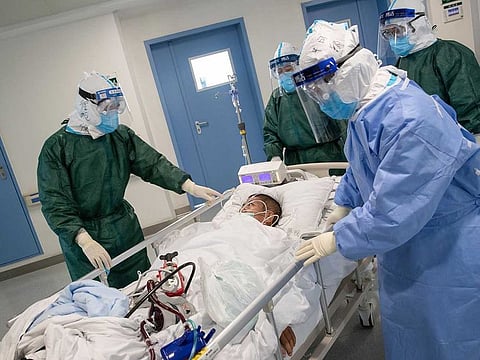Crisis line established for China's overwhelmed doctors
China is short of quality mental health services, just 2.2 psychiatrists for every 100,000

A nurse called the 24-hour hotline to complain about a constant headache. A doctor said he was feeling ostracized by the public, even as he worked to save patients from the epidemic. One caller said she was feeling suicidal.
The volunteers at Yong Xin Kang Yi ("Use your heart to fight the virus"), a crisis line established for the overworked, overstressed medical staff on the front lines of the coronavirus outbreak in China, listen to it all.
"Our principle is just to be emotionally available for them," said Erjing Cui, 28, a psychotherapist who volunteers for the hotline from Seattle, where she lives. "The most important thing that we'll try to do is to provide a space and listen and provide empathy to what they have to say."
Cui is one of many mental health professionals trying to address the emotional burden of the epidemic, which has subjected doctors and nurses to extreme hardships while rattling the nerves of ordinary people around the globe.
In China alone, hundreds of hotlines have been set up by universities, local governments and mental health organizations to help people cope.
But China has a shortage of quality mental health services - just 2.2 psychiatrists for every 100,000 people, according to the World Health Organization, which is about a fifth of what the United States has.
Cui, who grew up in the Chinese city of Guangzhou, is not the only therapist who volunteers for Yong Xin Kang Yi from North America.
"I think it speaks to the scarcity of well-trained psychiatrists and mental health professionals in China for sure," said Cui. She added that many hotlines in China do not provide their volunteers with crisis intervention training.
Yong Xin Kang Yi was formed in late January after Bo Zhu, a doctor at a hospital in Wuhan, China, where the virus emerged, and Hui Cao, a psychology professor in Beijing, grew concerned about the mental well-being of medical staff. The organization now has about 300 volunteers, including therapists, technicians and people involved in public outreach.
Dialing the number connects users to a therapist on call. The service also has a messaging function, hosted by the WeChat platform. In chat groups with hundreds of participants, therapists share recorded meditations, stories and soothing music, like Beethoven's "Moonlight Sonata."
About 15 to 20 calls come in on a typical day, roughly 40% of them from medical workers. Most are brief. At first, they came in more frequently, often from people feeling anxious about the virus.
Now, weeks later, the therapists more often hear doctors and nurses talk of stress, weariness and feeling invalidated.
Long hours of work, isolation from their families and a shortage of medical supplies are taking a toll. Even putting on protective gear, which includes tight masks and full-body suits, is starting to feel burdensome.
Medical workers say that patients sometimes lash out at them, and that other people avoid them, presumably out of fear that they carry the virus.
"We noticed people getting more psychologically exhausted," Cui said. "They're doing all the work, but at the same time they don't feel respected."
When Cui picks up the phone, she lets callers express themselves. She may offer concrete suggestions, if the caller is receptive to that.
But the conversations are not replacements for therapy sessions, she said. Doctors, nurses and their families may not fully process the effects of their experiences, which could include post-traumatic stress disorder, until much later, she said.
The therapists file a report on each call. Regular video meetings give them a chance to check in with their colleagues.
For Cui, who has lived in the United States for more than a decade, the work is a balm. She had an immediate urge to help when the outbreak began, and was thinking about donating masks when she saw a call for mental health professionals on WeChat.
In especially painful moments - like the death of Li Wenliang, the doctor who tried to raise alarms about the coronavirus - volunteers have gathered online to support one another.
"If I wasn't in this group, it would be hard to cope by myself," Cui said. "I feel like this is what I should be doing."







